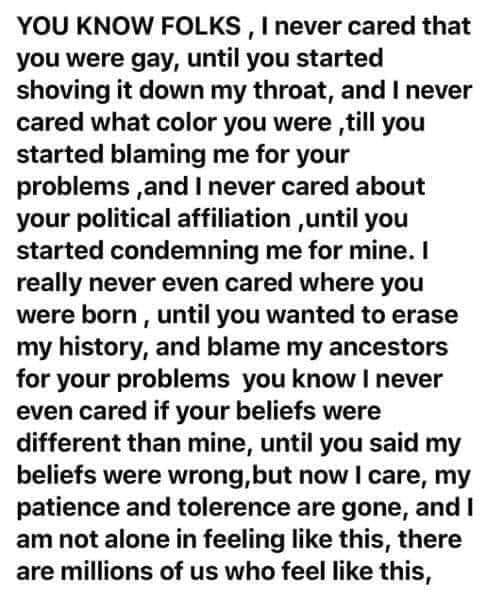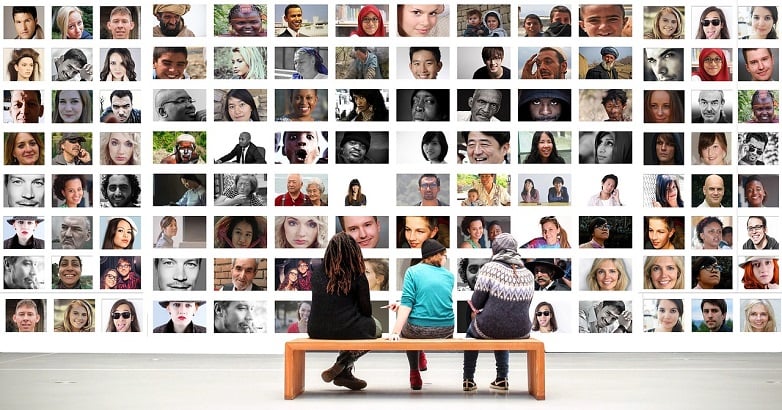What if the Church valued diversity and welcomed differences instead of feeling threatened by them? What if the Church listened to the Other?
The meme below has been circulating around social media in the United States. It appears to be written by a conservative White Evangelical American. Mostly, the meme gets shared by people of that ilk. Aside from the run-on sentences and poor punctuation, I have to point out how unchristian this meme is.
What if the Church Listened to the Other?
As I incorporate this meme into my “What if the Church…” series, I want to ask, “What if the Church listened to the Other?” One thing wrong with this meme is that it represents an unwillingness to listen to and appreciate the Other. Contrary to that sentiment, I want to take time to listen to what the meme is saying. This means being attentive. It means reading not just the meme itself, but understanding what it’s saying, between the lines. Here are nine observations I’ve made, by attentiveness to the text of this meme:
-
Shoving “gayness” down people’s throats.
This is code for “being visible at all.” Non-affirming, straight, cisgender people believe that you’re shoving gayness down their throats if you hold hands in public, kiss in public, or appear in any way to be gay in public—whether you’re with your partner or alone. If you’re fabulous, then you’re shoving it down their throats. So, they create “don’t say gay” laws to keep you from shoving it down their throats. But they don’t see themselves as shoving their heterosexuality down your throat if you’re gay. In other words, they are the norm, and you are aberrant. They never cared about you as long as you remained in the closet.
-
You started blaming me for your problems.
I just want to point out two words: “your problems.” The author of this meme refuses to acknowledge any connectedness between human beings. They fail to see that your problems are my problems, and my problems are yours. If someone asks for help solving a problem, the author jumps to defensiveness rather than assistance. “That’s your problem,” they say. “Don’t blame me.” This sounds like someone in an abusive relationship, come to think of it…
-
You started condemning me for mine.
This statement mistakes disagreement for condemnation. It feels threatened when someone with a different political affiliation offers challenges to their preconceived notions. It criticizes critique as condemnation, thereby discounting anything the critic has to say.
-
You wanted to erase my history.
It’s interesting that the meme’s creator doesn’t feel a personal responsibility for the deeds of their ancestors, but they clearly state that this is “my history.” Not “our history,” but “mine.” They scapegoat people who were born elsewhere for the erasure of their history, not understanding that enlightened people who were born in the same place also want to leave the atrocious parts of the past in the past. They also refuse to acknowledge that the only parts of history that people want to scrub are those that make others feel marginalized, threatened, and oppressed. They would rather tout Replacement Theory and blame immigrants for their troubles.
-
Blame my ancestors for your problems.
This disregards the fact that White people have not only been numerically dominant but socially oppressive in North America for the past five hundred years. It only acknowledges individual responsibility, without recognizing corporate culpability for the oppression of BIPOC people. It equates responsibility with blame, which are two different things. The fact is that White people ARE responsible for many of the problems that non-White groups experience in North America.
-
You said my beliefs were wrong.
Now that’s the pot calling the kettle black! Conservative, White, Evangelical Americans are the first to tell people that their beliefs are wrong if they differ at all from a perceived norm of Whiteness and Americianity. The author of this meme just can’t take as good as they give!
-
I never cared that you were gay…what color you were… your political affiliation…where you were born…your beliefs were different than mine…
The problem, dear reader, is that the author of this meme never cared about other people’s differences. As long as minorities remain in the closet, in the background, in silence, in their place of origin, in submission—the author (and people who share the meme) don’t care. They aren’t interested in seeing differences. In fact, they don’t want those differences “shoved down their throats” (aka visible). They don’t take the time to get to know people who are different from them. They don’t care what makes a group of people distinct, interesting, unique, special, or desirable. They don’t care—and they don’t want to know.
-
Now I care, my patience and tolerance are gone.
The only time they care is when the Other becomes too “uppity.” When people start singing “We’re not gonna take it anymore,” suddenly Conservative, White, Evangelical Americans begin to care. But not in a positive way that says, “Oh, I’m sorry I was so insensitive before—let me see what I can do to fix that.” No—that would be too woke. Instead, they start to care in a way that calls upon them to be “patient” and “tolerant” (words used by a high-handed majority in relation to a submissive minority). And, when those minorities still refuse to yield, even those seeming virtues disappear.
-
I am not alone in feeling this, there are millions of us who feel like this.
When I was a pastor, complainers used to come to me saying, “People are saying….” They wanted me to know that they weren’t the only ones who felt this way, but there were others on their side. It was a way for bullies to try to inflate their numbers without revealing that “people” meant “me, myself, and I.” Unfortunately, I’m certain that there are millions of Americans who do feel the same as this meme’s author. They prove it every day as they threaten to Make America Gross Again.
Image by Gerd Altmann from Pixabay
Am I Just as Guilty?
After reading what I just wrote, I have to ask myself, “Am I just as guilty as the author of the meme? By picking apart their writing, have I shown myself to be closed off to their ideas? I don’t believe so—and here’s why. First, because I sat with the meme for days, reading and re-reading it with care and consideration. Second, because I put myself in the shoes of the author to understand their fear of the outsider, the unknown, and their self-understanding as the definers of societal norms. Third, since I have spent half a century with people who embrace these attitudes, it’s easy for me to understand the perspective of the meme’s author. In this article, I am practicing what I preach—I am listening carefully and thoughtfully responding.
What If the Church Valued Diversity?
After answering each of these nine points, I have to ask, “What if the Church valued diversity?” What if, instead of becoming defensive when people come from the outside and challenge our old understandings, we leaned into that discomfort? What could we learn if the Church listened to the voice of the Other? It might make us humbler, more welcoming, and inclusive. Unfortunately, these traits are the antithesis of what many conservative, White, Evangelical Americans espouse. But what if…? What if the Church could learn…to learn? By embracing diversity, we could become more like the multicolored and amazing world that God created.















